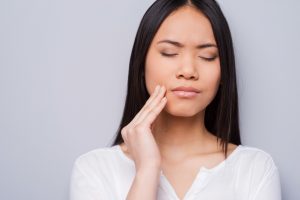Beep…beep…beep…Good morning! As your alarm clock goes off and wakes you out of a sound sleep, you groggily get up and head to the kitchen. As you go to give your significant other a quick peck, they hastily turn their cheek at the last second. Yikes! In a not-so-subtle way, your partner might be giving you a clue that your breath isn’t so great. Unfortunately, even if you feel as fresh as a daisy after a good night’s sleep, your breath doesn’t smell like one. Considering that you brush and floss each night, you may be confused as to why this is still happening. Not to worry! As a dentist in San Diego, we’ll explain why no one is immune from morning breath and what you can do about it.
Why Do We Get Morning Breath?
It would be understandable to have morning breath if you weren’t brushing and flossing the night before. But when you’ve put in the effort and still have an unpleasant odor in the morning, it can be frustrating.
You may be surprised to hear it, but one of the biggest culprits is largely beyond your control. Salivary flow decreases when you’re asleep at night, causing your mouth to become dry. Saliva naturally keeps the mouth clean because it washes away plaque and bacteria.
Without adequate saliva, the soft tissues like the tongue, gums and back of the throat become sticky and coated in bacteria, contributing to odor in the morning.
It’s also not uncommon to “mouth breath” at night. Instead of breathing primarily through your nose, your mouth drops open to allow enough oxygen through your airways, resulting in dry mouth that exacerbates the problem.
What Can You Do?
Although it can’t be eradicated entirely, here are some things that can help keep morning breath at bay!
- Good hygiene – Although this doesn’t take care of the problem on its own, it does make a big difference! Morning breath would be much worse without good brushing and flossing.
- Sugar-free Gum –If you’d like a quick solution, keep some minty, sugar-free gum on the nightstand. It helps to get the salivary flow going and leaves a refreshing taste in your mouth.
- Stay hydrated – If you aren’t staying hydrated, one of the first places you’ll notice it is in your salivary flow.
- Lifestyle – Whether it’s tobacco or lots of garlic at dinner, your habits and lifestyle choices can contribute to this issue.
- Acid Reflux- If you suspect you have acid reflux, seek a diagnosis and treatment from your doctor. It can be a big factor in causing bad breath – especially in the morning but throughout the day as well.
Lastly, always make sure you’re having bi-annual checkups and cleanings with your dentist in San Diego. Even with great habits at home, there’s always plaque and tartar that you can’t remove on your own that contributes to bad breath!
About the Author
Dr. Greg Friedman and Dr. Kory Grahl are dedicated to helping their patients feel great about their oral health. They know the impact that confidence can have on someone’s life, including the confidence from knowing how to achieve fresh breath – from morning to night. They can be reached for questions via their website or at (858)-682-2394.




